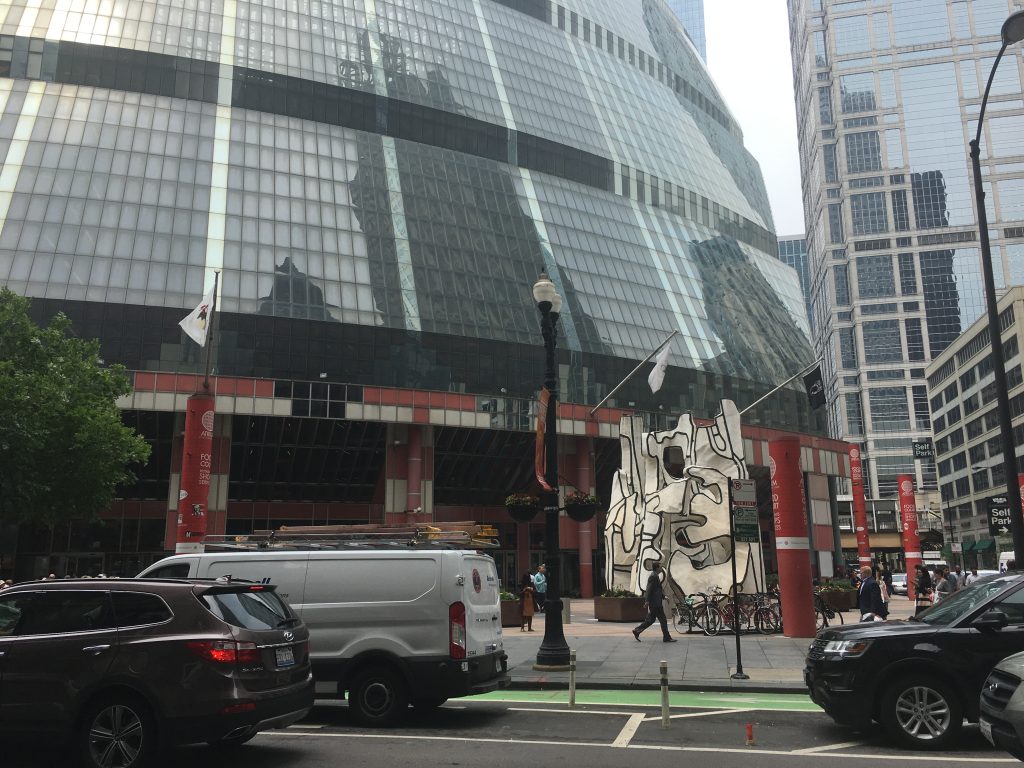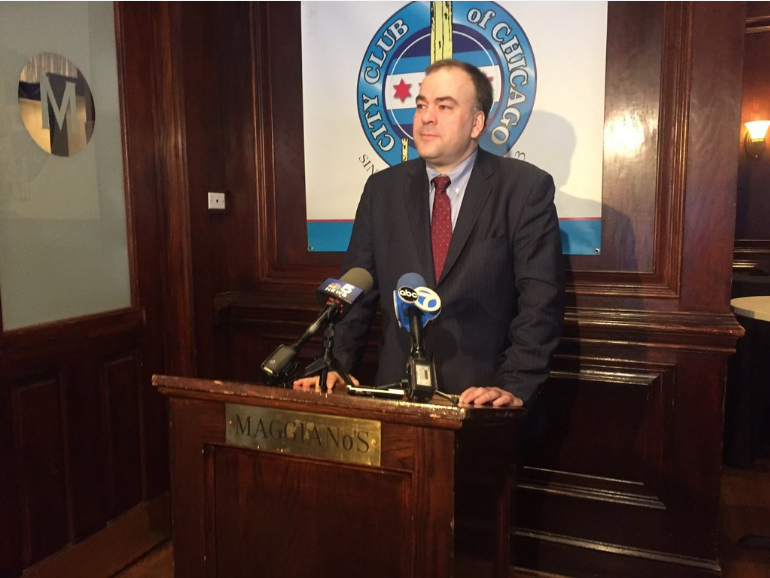Springfield News
-
Gov. JB Pritzker signed a two-year-old bill Friday that gives state officials the green light to sell the James R. Thompson Center, potentially paving the way for the massive building much loved by preservationists and loathed by others to be torn down.
 The Thompson Center in the Loop. [Heather Cherone/The Daily Line]
The Thompson Center in the Loop. [Heather Cherone/The Daily Line]
Pritzker laid out a five-phase, 22-month timeline for the sale of the building with salmon pink and baby blue color scheme at 100 W. Randolph St. in the heart of the Loop named after former Gov. Jim Thompson and designed by German American architect Helmut Jahn.
In the next four to six weeks, state officials will ask firms to indicate their interest in purchasing the site, Pritzker’s office said in a statement.
Withing within three to six months, state officials “will re-engage negotiations with the City of Chicago regarding zoning and transit station,” according to the statement.
State officials will begin discussions with interested purchasers and publish a request for proposals to acquire and develop the property by Labor Day, according to the timeline laid out by Pritzker’s office.
Those interested in the property will get four to five months to develop their proposals and submit them to state officials, according to the timeline laid out by Pritzker’s office.
State officials will evaluate those proposals in three months, and then take another two months to select a winning proposal, according to the timeline laid out by Pritzker’s office.
SB 886 requires that whoever purchases the site reach an agreement with Chicago and CTA officials to maintain the operation of the Clark and Lake station.
Thompson Center employees will be moved to the Michael A. Bilandic Building and “other under-utilized, state-owned or rented facilities, consistent with recommendations made by the newly-created Pension Asset Value and Transfer Taskforce.”
Passed by the House and Senate in May 2017, Senate President John Cullerton (D-Chicago) placed a motion to reconsider on the bill, sending it into legislative limbo until he lifted that motion on Jan. 19, when it landed on Pritzker’s desk.
The budget approved by the General Assembly in May and signed into law by former Gov. Bruce Rauner counted on approximately $300 million from the sale of the Thompson Center — even though Chicago Mayor Rahm Emanuel and 42nd Ward Ald. Brendan Reilly, who would have to sign off of any redevelopment of the entire city block between La Salle, Clark, Randolph and Lake streets, had not seen a new proposal for the property.
In November, the governor’s office acknowledged in the Illinois Economic and Fiscal Policy Report that the building would not be sold any time soon — blowing a $300 million hole in the state’s budget.
Pritzker has pledged to use the proceeds from the sale of the Thompson Center to reduce the state’s unfunded pension liabilities and to pay down the bill backlog, which stands at $8.3 billion.
However, Pritzker’s proposed budget does not rely on any revenue from the Thompson Center’s sale, a move he criticized as a budgetary trick used by Rauner.
Rauner first called to sell the Thompson Center in 2015, saying the 17-story postmodern office building that opened in 1985 is “ineffective,” “inefficient” and “in disrepair.” A 2017 estimate pegged the cost of repairing the building at $326 million.
In January 2017, Rauner’s office released a conceptual study by Adrian Smith + Gordon Gill Architecture to show what the Thompson Center site would look like with three new towers, or just one standing 1,700 feet tall, or more than 200 feet taller than Willis Tower.
However, Reilly has said getting $300 million for the property “could be a stretch” since it assumes city officials would approve a far denser development than currently permitted and that the Downtown office real estate market remains red-hot.
Neither Reilly nor Mayor-elect Lori Lightfoot immediately responded to a request from The Daily Line for comment on the governor’s action,
Emanuel's office declined to comment on the bill signing.
In May 2017, Emanuel said he would block the sale of the Thompson Center until he was certain that Chicago taxpayers won’t get “stuck with” the $80 to $120 million tab for rebuilding the massive CTA station at the state building.
Related:- Bill approving the sale of the Thompson Center lands on Pritzker’s desk
- Thompson Center won’t be sold this year — blowing a $300M hole in state budget, governor’s office acknowledges
- Thompson Center enthusiasts rally to ‘Save Our Starship’
- Ald. Reilly: ‘No One Has Come To Talk To Me’ About A New Plan To Replace Thompson Center
- State Budget Relies On $270M From Sale Of Thompson Center — But Mayor’s Office Says No New Proposal On Tap
-
The Illinois Supreme Court ruled 4-3 Thursday to grant former lobbyist David Piccioli, a teacher’s pension — despite the fact that he only worked a single day as a substitute teacher.
-
A bill designed to give assessors more information about the value of commercial properties championed by Cook County Assessor Fritz Kaegi cleared the Illinois Senate Thursday — one day after drawing opposition from the Civic Federation. Another bill that would require schools to teach about consent as part of sexual education courses also advanced.
-
Will the third time be the charm for those working to end mayoral control of Chicago’s schools?
Chicagoans would be represented by an elected — not appointed — school board, under a measure approved by an Illinois House vote of 110-2.
Similar measures were approved by the Illinois House in each of the last three years — before stalling in the face of opposition by Mayor Rahm Emanuel and former Gov. Bruce Rauner. -
When Zach Koutsky heard his wife’s doctor tell her to avoid handling store receipts to prevent her baby from being exposed to poisonous chemicals, Koutsky realized the common item posed a serious health threat.
Most traditional retail receipts are printed on heat-sensitive paper, which do not use ink but instead trigger a chemical reaction between Bisphenol A, known as BPA, or bisphenol S, known as BPS, and the paper.
Scientists have long known BPA can mimic estrogen when it enters the human body, disrupting hormone levels, as well as reportedly contributing to diseases like diabetes, asthma and cancer.
Koutsky said his wife’s doctor said “[She] shouldn’t touch movie theater receipts, parking tickets, airplane boarding passes.” So Koutsky, the legislative and political director for the United Food and Commercial Workers Local 881, began snatching the receipts at the check-out counter.
But Koutsky soon realized he could be putting himself at risk.
“And who do I represent?” Koutsky said of his work for UFCW. “People who touch hundreds of these a day.”
HB 2076, sponsored by freshman State Rep. Karina Villa (D-West Chicago), would ban the use of BPA-lined receipts in Illinois.
-
Cook County Assessor Fritz Kaegi struck back Wednesday at the Civic Federation for “misleading” lawmakers after the organization publicly opposed a bill designed to give assessors more information about the value of commercial properties.
-
A bill that would give the Cook County Assessor’s office — and other offices statewide — the ability to collect operating income and expense data from commercial properties, instead of having to guess at the valuations, is set for a Senate vote this week, and could come as soon as Wednesday.
 Assessor Fritz Kaegi addresses reporters. [A.D. Quig/The Daily Line]
Assessor Fritz Kaegi addresses reporters. [A.D. Quig/The Daily Line]
-
In a month marked by deadlines to get bills out of committee, the Senate last week passed a bill unanimously — with relatively little fanfare — that would satisfy both calls for criminal justice reform and for a more focused approach to solving the growing problem of retail theft.
-
The latest entry in The Daily Line’s occasional bill tracker is an amendment to SB 958 from state Sen. Dan McConchie (R-Hawthorn Woods), who wants state officials to take a page from Chicago in getting axel-destroying potholes filled fast.
-
The Illinois Chamber of Commerce on Thursday filed its own proposed capital bill Thursday — just one week after the International Union of Operating Engineers Local 150 filed their own bill out of frustration with Gov. JB Pritzker’s office.
 A city crew patches a pothole. [Quinn Ford, DNAinfo Chicago]
A city crew patches a pothole. [Quinn Ford, DNAinfo Chicago]
The chamber’s plan is focused on “horizontal” projects — as in roads and bridges — which is similar to Local 150’s plan. The chamber’s plan aims to raise about $2 billion per year.











